
Books by Sharon McKay:
Sharon McKay
Profile by Dave Jenkinson.
chutz·pah also hutz·pah, noun.
def'n: Utter nerve, aggressive boldness, non-conformist but gutsy audacity

As you will come to see, finding a photo of Sharon McKay next to this word in a dictionary would not be out of place.
Born in Montreal, Quebec, on January 29, 1954, Sharon says, "My dad came from Verdun. His story was one of those 'poor guys makes good.' The result of his rapid rise was a new house and my changing schools three times in grade 2."
"The three schools in grade 2 took its toll. I failed grade 3. Today, I would have been recognized as a child who had lost her footing and been given extra help. Instead a giant 'Not Promoted' sign in red ink no less appeared on my report card. Why the red ink? Did they think I wouldn't have noticed?"
"I was one of those willowy, stringy kids with knots for knees and elbows meaning I was a foot taller than everyone else to begin with. Failing a grade meant that I was now the giant kid. Of course, as soon as I figured out how to read, I soared. Reading was the refuge I used to get away from all of those short people."
"Until I turned 12, my summers were spent at Lake MacDonald in the Quebec Laurentians. We had a massive, lakeside house on rolling land that Pollyanna would have loved. I swam, water-skied and read. It was an idyllic time. Then my maternal grandfather sold the house and that was that."
Summers changed. "From the age of 12 on, I was now packed off to Belfast, Ireland, with my paternal grandmother. In Belfast I lived with my aunties but spent my days with three nutty uncles. We got arrested several times, caught in the crossfire twice, and our favorite haunts were bombed out a couple of times. We just never told my parents. One uncle, Uncle Jim, didn't have a right leg. Whenever the three uncles and I went on long runs in the car, a cramped Mini Minor, he'd take it off. We'd go into pubs and drink beer, only myself and the driver Wee Eddie as I called him. My other two uncles were teetotalers. These three old uncles loved me unconditionally. They thought that I was perfect. I was the most flawed child on the planet, and yet there they thought I was wonderful, marvelous, funny and pretty. At home, I was a bad student and a pain-in-the-neck. In Belfast, I was just somebody else entirely."
"My aunties weren't so keen on me, and one auntie even took a broom to me. She had a right. I was caught selling bogus stories to newspapermen – and I do mean men. Well, actually three of us were caught. When Belfast started to go up in smoke, the reporters wouldn't get off their hotel barstools. It was too scary out there. They would pay kids to check out their stories. Well, we would just take their coins and then make the story up. We took this one stupid reporter to a place where the government was tearing down the buildings. He snapped a few pics – from the car as I recall. The pictures ended up in the paper with the heading 'Belfast in Ruins.' I can't remember how we were caught, but once Aunt Phia found out, I was given three choices. I could be sent home or I could stay with my aunties all day, think house arrest. My third choice was to go up to the Antrim coast near the Giant's Causeway. I went up to the coast to live with more extended family – there seemed to be no end to my family in Ireland. I got a little unpaid work sheep dipping. My three uncles drove up a few times a week and off we'd go on our wee runs. Summer after summer I had a wonderful, amazing life with them."
When asked about her childhood career aspirations, Sharon replies, "I was given the message very young that I would 'marry well.' I had long blond hair, and I was incredibly thin. I was cute, not beautiful, but cute would do. I had no intention of marrying well, whatever that meant."
"The 60's were upon us, and I fit very nicely into 'Hippie World.' I left home at 17 and took to the roads. My parents gave my girlfriend and me train tickets to Van (we never referred to it as Vancouver). We got on in Montreal, got off in Dorval, (i.e. one stop outside of Montreal) cashed in the tickets and hitchhiked. The next summer I went off on my own and headed for Alberta. I worked first in Jasper Park Lodge's laundry until my hands got badly infected. (We folded wet sheets coming out of the mangler, but, in the afternoons, we'd be on the other side of the mangler, and so the sheets would be dry for folding. With the alternating wet and dry, my hands began to blister, and, after a while, they started to get infected.")
"I pretty well had to leave that job, and so I became a waitress (not server) in a Swiss-themed restaurant in the town of Jasper. I lived by myself in a little third-hand tent in a nude campsite. Daily I would walk through the campsite in my Swiss waitressing number with its little bodice thing, white blouse, hat and goofy shoes. Keep in mind half the people were nude and the other ones were hippies. Let's just say I stood out. There was this businessman who ran away from his life every summer to cook for the campers – very odd. We paid him a buck, and he cooked up a feast every evening. I ate very well that summer actually. It was a fun life, and I quite enjoyed it. Bears were a problem."
Sharon never did complete high school, and thereby hangs a tale, yet she has a college and a university degree. How? Chutzpah! "All my friends were going to university, and I hadn't graduated from high school. I didn't know what to do, but in September I tagged along with my friends when they were registering at Montreal's Dawson College, an English language CEGEP. Because this is precomputer days, it was open air registration with all of the tables set up outside. It was a beautiful day. And then it hit me --- I had no life! I saw this lineup of young women, and I asked somebody, 'What are you lining up for?' She said, 'This is the lineup for unwed mothers.' The Pequistes (PQ) had come into government in Quebec, and they had a whole new program for unwed mothers. At that time, a pregnant girl was ousted from the public school system. And so they developed a college program for unwed mothers. I got into that unwed mothers line."
"Now it's a funny story but at the time, I was terrified. The woman doing the registering was dressed in a grey suit with a broach at her throat. She asked, 'Name? Address?'( like I was too stupid to fill in my own form), and then she snapped, 'Age of your child?' I hadn't thought of that. Right above her, there was a calendar that said 'September 9.' I replied, Nine.' She looked up at me slowly. I was 17 years old. 'Months,' I added."
"I got into Dawson, and I loved it. I signed up for everything that had 'ology' at the end of it, except biology. If it had 'ology,' like psychology, anthropology, sociology, I was there because those courses always had papers. I stayed away from classes with exams and from math."
"I supported myself and did my schooling all on my own. Then I met my husband David at a party. As soon as I saw him, I knew he was a 'keeper.' I moved in the next day, married three years later – to the day. Thirty years later we're still together."
In the province of Quebec, the proper path from high school to university is first to complete the two-year CEGEP program and then to go on to university, but that was not Sharon's way. Once again, chutzpah. "I decided to skip CEGEP and go right on into university. I enrolled myself in Champlain College on the Bishop's campus in Lennoxville, Quebec. I found a loophole which was, if you went to Champlain College and if you were accepted there, you could sign up for courses at Bishop's University. What I did was sign up at Champlain and take courses at Bishops University. I did well I think. Then I filled out the transfer forms from Bishops to York University. Nowhere did it ask, 'Were you ever accepted at Bishops?' I just transferred laterally. While at York, I never counted the credits I was taking, and finally they wrote me, saying, 'By the way, you have been graduated. You can stop any time now.'"
"After David and I graduated, we tried the poverty thing again, the working poor, and decided, 'To hell with this. Let's go back to school.' So David did his MBA at Concordia in Montreal. David's a vice president of the firm he works for. So, you see, I actually married well. I didn't mean to. I thought I was marrying an unemployed physicist."
"David was working for Holt Renfrew when our first son, Sam, was born. I could not bear the thought of putting him (Sam not David) in a day care, but I needed to work, I wanted to work. I went to the Brampton Guardian with Sam in the back seat of our tiny Renault Five. I asked to see the editor, which seemed like a good place to start. I thought that the way newspapers worked was that you would go in and they would give you an assignment. I thought I could chase ambulances and Sam could come with me."
"The editor at the time sat behind a desk piled high with, choose one: Harvey's, McDonald's, Burger King wrappers. At one point, I thought he was doing a survey of some sort. These were the days when you could still smoke in offices, and the secondhand smoke was everywhere.
To the editor I said, 'I can write (I think).'
'Well, what do you write?' he asked.
Since I had this child in my arms, I replied, 'I write about babies.'
'Oh, you're a parenting writer,' he responded..
"Yes, I am,' I acknowledged while thinking, 'Parenting.' (What is that? A verb? A noun? Remember this was 24 years ago.)
Then he asked, 'Do you have a portfolio?'
'No,' I admitted.
He looked at me, while sort of rolling his eyes, and said, 'I'll tell you what. Have you heard of streetproofing?'
'Yes,' I lied.
'Give me a couple of articles on streetproofing. I'll pay you ten bucks a pop, and, if I like them, we'll talk,' said the editor.
('Streetproofing?' I'm thinking rustproofing.)
And so it began. Every night David would pinch his portable computer from work. Back then, portable computers looked like Singer sewing machines, and the sides flipped down. To 'steal' his own computer, David would have to work until about 8 o'clock every night in order to wait until the last guy went home. Then he would put it in the car and bring it home. In the morning, he had to get the computer back before anyone arrived. Consequently, he was the last person to leave every day, and then he was also the first guy there. This guy owes his career to me."
"I would type through the night, and then in the morning, I would wake David up and ask, 'How about this?' I still read everything out loud. When I talk to kids in schools, I tell them, 'Just read it out loud.' I rewrote those columns for weeks. I didn't know how to interview. I didn't have my own car. I would pack up the baby, leave the house in the dark, drive David to work, come home, put the baby back to bed, and then write longhand so that I would have something to type in at night. This went on for months."
"After six months, I had a portfolio which I took to a national parenting magazine, and they gave me a new section, called 'Stages'. Once I got the magazine, I went to the Toronto Star. All of this actually took place within two or three months. I had only done one article for the magazine when I went to the Toronto Star and said, 'I write for a national magazine. I've been in the newspaper. I have all these columns. I would like to do a parenting column for the Toronto Star.' The man asked, 'Do you have a portfolio?' Oh man, was that the right question. Without even looking at it, he hired me. Bless him. I wrote for all the 'Neighbours' sections. Great money since all the different papers paid separately."
"What I needed now, I decided, was a book, and my first book was called Streetproofing Gently and Creatively, a book against streetproofing. By this time, I was a bloody good expert on the topic, and what I knew about it was that it was the wrong way to raise children. I also had done enough research in Ottawa to know that child abduction by strangers was virtually unheard of. The book information was solid, but there were hundreds of typo's, repeated paragraphs - horrible. I didn't know enough to complain."
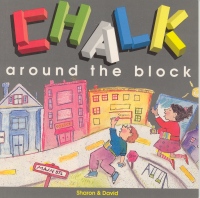
In addition to the streetproofing book, Sharon also wrote three other nonfiction books for parents between 1989 and 1995.
Sharon's next step into the publishing world was via a packaging job. "One day, I walked into Jane Somerville's office at Somerville House with three pieces of chalk in an elastic band, and I said, "I want to make chalk this big.' We think that sidewalk chalk has been around forever, but it hasn't. It came out with this book, Chalk Around the Block."
"We bought our log house in Kilbride, Ontario. David became a Beaver/Cub Pack leader, depending on the ages of our two sons. (Joe was born in l989.) David would take my manuscripts for these little Somerville books to his meetings and say, 'Sharon's got a new book. We're going to try it out.' While the kids were having fun, we were able to field-test the instructions. David would read out the instructions and offer not a single word of further explanation. If the boys couldn't understand the instructions as read, then it was back to the drawing board. That's why David's name's on that book. He got a $25 royalty check this year. I don't think people realize how good those books were in the sense of their user-friendliness."
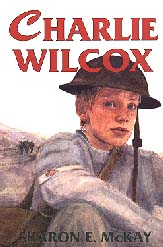
Along the way, Sharon worked as an acquisition's editor and an editor of a small newspaper. From there, Sharon moved on to writing historical fiction. "With Charlie Wilcox, I meant to write a book on sealing. I think the best writers for this age group are actors in their hearts, and I acted as a teenager all the time. I was in Théâtre de la Poudrière and small stint in Centaur Theatre in Montreal. I was always in a play somewhere, and I always loved it. Now, as an author, I can play all the parts."
"The other thing that led to Charlie Wilcox was that I got a Canada Council grant. I had only filled out the application because I was in Ottawa hosting a terrible television show at the time and was bored. I filled out this application, did an outline for the story, and then they gave me money. I was horrified that I had taken other people's money and thought, 'There's a whole bunch of writers out there that are more deserving than I am. I had to do a good job, I just had to.'"
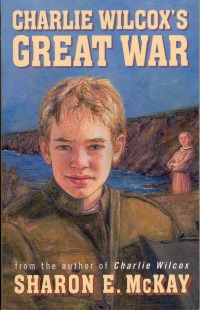
Charlie Wilcox's Great War, while a sequel to Charlie Wilcox, also overlapped in time with it. Sharon explains why she concluded Charlie Wilcox's Great War with an epilogue. "As a child I would wonder about book characters I had come to care about. 'Were they OK? Did they go on to do good things? Did the bad guys get it in the neck?' And so at the end of Charlie Wilcox's Great War, I gave each character a full and fruitful life! It was great fun. The only character I didn't close off in the epilogue was Davy. I kept Davy because here is a boy with no legs, who has a fan base. I have received thousands of letters asking about him. It would seem that it is Davy's destiny to have his own book. We'll see."
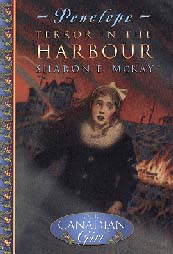
Sharon has also been part of an historical fiction series for preteen readers. "I was the first one signed on in the Penguin 'Our Canadian Girl' series. I was pitching a boys' series, 'Sons of Canada.' 'It can't be done,' they said. 'We can't do the numbers.' I've been an editor long enough to know that the numbers are everything. We can't do a boy series in Canada like we can do the 'Our Canadian Girl' books. If there's going to be a boys' series, it will be a series suitable for an international audience."
Sharon selected the period following the Halifax Explosion of 1917 for her "Our Canadian Girl" books featuring Penelope because, she says, "It was exciting, and because of Charlie Wilcox, I now knew a great deal about the World War I period."

"I discovered Esther," (the real person behind Sharon's most recent YA novel) "years and years ago in Montreal. I just didn't think I was the right person for her. A writer for the Montreal Gazette wrote a column about her. I don't know why, but I cut the piece out and put it on the fridge, and then we moved and I think I just threw it away. Still years later, I was part of the Christian Jewish Dialogue Holocaust Remembrance Committee, and again I stumbled over her. A friend of mine at Key Porter gave me a book on the history of the Jews in Canada by Irving Abella. When I opened it up, there was Esther, but just two paragraphs. I must have approached four or five people to say, 'It's yours. Do this.'"
"Characters like that either work for you or they don't. No one else seemed interested, and I couldn't understand why they just didn't jump on it. It was Barbara Berson, editor at Penguin, who said, 'Why don't you give it a shot?' And I said, 'But she's a Jewish girl.' Oddly, I find it really annoying when I see really strong writers who are Jewish and who won't write about a blonde girl from the suburbs. How does that stretch you? You do things, and sometimes you fall on your face. What's the worst that can happen? You'll get a bad review, but you'll live."
"So I wrote a first chapter. I read it to Joe who was then nine years old. Joe sat there for a minute, before saying, 'Full frontal nudity in the first chapter. You've so lost the library sales.'"
"I'm still not terribly happy with Esther. I think there's places where she got soft. I did run into a deadline problem. My fault, but I'd rewrite sections if I could."
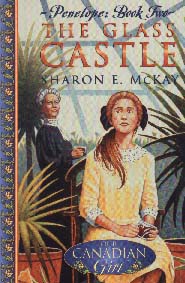
"A real concern about writing historical fiction is historical accuracy. People don't realize how cheap it is to pay someone to read something and double-check your history. Here's an example. I paid a French historian a hundred dollars to read the New France material. She wrote back, beginning by saying all the nice things that a writer likes to hear. You skip that paragraph. 'Where's the hard stuff?' and sure enough, there it was. In the editing of the beginning of the book, instead of its saying, as originally written, 'a ship with slaves coming down the St. Lawrence,' the editing had changed it to 'a slave ship.' Now, for me, that is a horrendous mistake. I know darn well that 99% of the people reading it wouldn't see it, but that one percent would nail me, as they should. How could I not see it? What was happening was that I was not happy with certain parts of the book, and so I was focused on that and skimming over the rest."
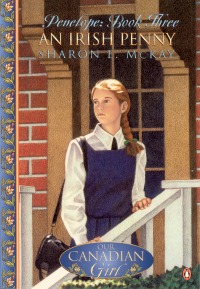
A further example of the value of using an outside fact-checker came with Penelope: Terror in the Harbor. Says Sharon, "I can go to any book in a library about the Halifax explosion, and it will say that a tidal wave happened after the explosion. First came the explosion, then the tidal wave, and then a snow storm. There was no tidal wave, but it's in the history books. It never happened. Via the web, I contacted the curator of the Halifax museum. He recommended an expert on the Halifax explosion. The result was a clean book. Our history is so flawed because writers are using secondary sources when we don't have to any more. On Avalon.ca, they have all the original documents of every major event in the history of man, things like the Magna Carta and the Nuremberg trial transcripts. Imagine reading the originals. These are wonderful things for kids, but until writers are prepared to do either original research or go to the original sites, we will propagate that bad material. It's dangerous because teachers are using historical fiction as textbooks."
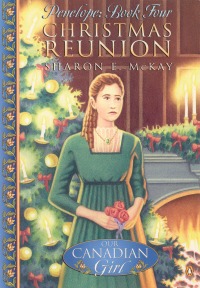
Asked if she a disciplined writer, Sharon responds, "Yes and no. My family and friends come first but if there's a deadline, work is first. It's what's in front of you at the time that needs the help the most. Sadly, writing hardly ever does."
This article is based on an interview conducted in Winnipeg, November 2, 2004, and revised November, 2005.